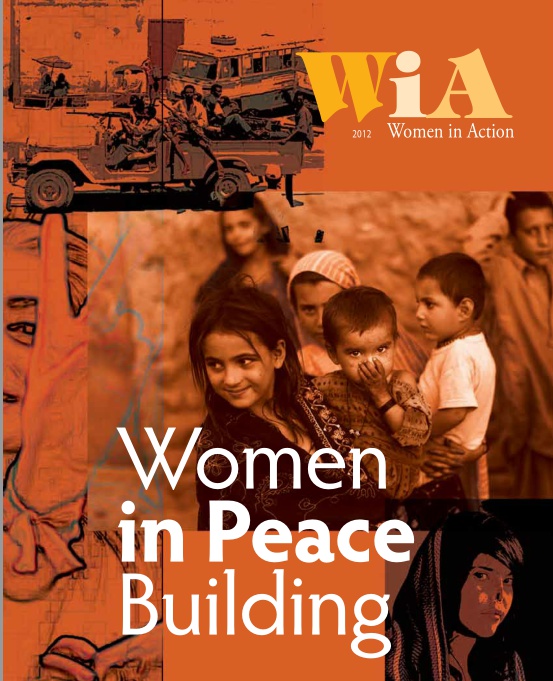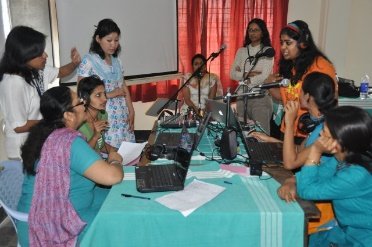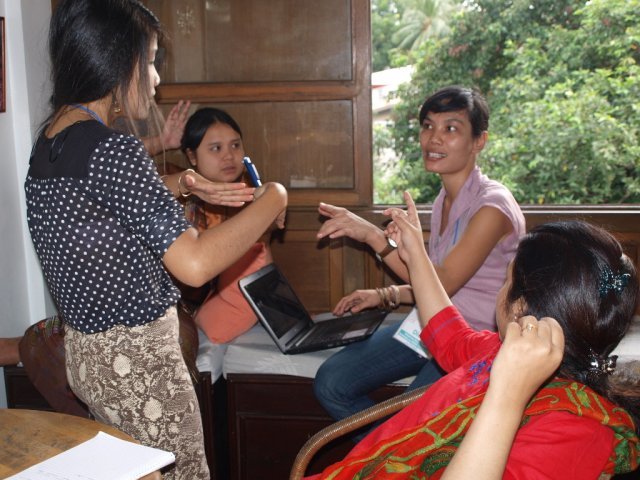by Claudia C. Lodia
Central to the underlying spirit of building sustainable peace is the realization that visions of peace are rooted in specific contexts. This particular understanding has been deployed as a dominant strand within the developing discourse on Women, Peace, and Security (WPS) in the Global South. With the passing of UN Security Council Resolution 1325 on October 31, 2000 − a resolution pushed for by feminist antimilitarists and non-governmental organizations (NGOs) cross-nationally, in order to formalize the mainstreaming of gender in peace and conflict operations − what has emerged and continues to take shape is the challenge of its implementation and translation.
 In the 2012 Women in Action (WiA) issue titled, Women in Peace Building, Cynthia Cockburn gives a critical account of the North Atlantic Treaty Organization's (NATO) "adoption" of UNSCR 1325. Despite NATO's rhetoric which supports the idea of gender mainstreaming in matters of peace building, its pragmatic approach to Women, Peace, and Security actually resulted in a co-optation of UNSCR 1325 and its incorporation into NATO's pro-military structures and programmatic agenda. What Cockburn seems to suggest is that NATO's efforts to implement a global gendered vision of peace is rooted in the way it inherently defines and operates the meaning of "security." That even in its promotion of a higher proportion of women in militaries – a strategy intended to protect women in war − NATO, by virtue of its structure and logic, "leaves the war system undisturbed" and thus counters the antimilitarist intention of 1325 (Cockburn, 2012). I would also add that NATO's strategic recruitment of women in militaries espouses an expansionist idea that women, cross-nationally, consent to war. It is in this sense that I see eye to eye with Cockburn in her assessment of the technical deficiencies global-scale political bodies perpetrate in 'doing' (mainstreaming) gender toward peace building.
In the 2012 Women in Action (WiA) issue titled, Women in Peace Building, Cynthia Cockburn gives a critical account of the North Atlantic Treaty Organization's (NATO) "adoption" of UNSCR 1325. Despite NATO's rhetoric which supports the idea of gender mainstreaming in matters of peace building, its pragmatic approach to Women, Peace, and Security actually resulted in a co-optation of UNSCR 1325 and its incorporation into NATO's pro-military structures and programmatic agenda. What Cockburn seems to suggest is that NATO's efforts to implement a global gendered vision of peace is rooted in the way it inherently defines and operates the meaning of "security." That even in its promotion of a higher proportion of women in militaries – a strategy intended to protect women in war − NATO, by virtue of its structure and logic, "leaves the war system undisturbed" and thus counters the antimilitarist intention of 1325 (Cockburn, 2012). I would also add that NATO's strategic recruitment of women in militaries espouses an expansionist idea that women, cross-nationally, consent to war. It is in this sense that I see eye to eye with Cockburn in her assessment of the technical deficiencies global-scale political bodies perpetrate in 'doing' (mainstreaming) gender toward peace building.
 In view of this account, feminist antimilitarists and women peace advocates have, and are continuously counter-directing and transforming such deficiencies into self-critiques; forging creative strategies and methodologies that reclaim and maintain the intentions of UNSCR 1325 to build and keep peace. For instance, in 2006 and 2007, Isis International in collaboration with AMARC-WIN Asia Pacific, initiated pilot trainings for Women Making Airwaves for Peace (WMAP), a cross-cultural radio production that aims to sharpen women participants' perspectives in "engendered peace journalism, interview techniques, and feminist broadcasting." WMAP continues to be a powerful strategy for peace building and disaster mitigation. This approach to broadcasting creates an opportunity that provides people in areas of conflict access to specific stories of women community radio journalists on the ground while enabling women's involvement in this level to fully take root. Other forms of stakeholder information-exchange specific and relevant to engendered peace building are described in a 2011 research by Isis International, one of which is the Regional Cheekah Session. This session was designed to encourage informal flowing conversations through clay-play and collage making among women peace advocates, representing civil society organizations and local government units in the Luzon, Visayas, and Mindanao regions in the Philippines. Not only were they able to use this session as a safe space to speak freely about the gendered impact of armed conflict, this space also enabled further dialogues about women's displacement, trauma, and economic marginalization due to war.
In view of this account, feminist antimilitarists and women peace advocates have, and are continuously counter-directing and transforming such deficiencies into self-critiques; forging creative strategies and methodologies that reclaim and maintain the intentions of UNSCR 1325 to build and keep peace. For instance, in 2006 and 2007, Isis International in collaboration with AMARC-WIN Asia Pacific, initiated pilot trainings for Women Making Airwaves for Peace (WMAP), a cross-cultural radio production that aims to sharpen women participants' perspectives in "engendered peace journalism, interview techniques, and feminist broadcasting." WMAP continues to be a powerful strategy for peace building and disaster mitigation. This approach to broadcasting creates an opportunity that provides people in areas of conflict access to specific stories of women community radio journalists on the ground while enabling women's involvement in this level to fully take root. Other forms of stakeholder information-exchange specific and relevant to engendered peace building are described in a 2011 research by Isis International, one of which is the Regional Cheekah Session. This session was designed to encourage informal flowing conversations through clay-play and collage making among women peace advocates, representing civil society organizations and local government units in the Luzon, Visayas, and Mindanao regions in the Philippines. Not only were they able to use this session as a safe space to speak freely about the gendered impact of armed conflict, this space also enabled further dialogues about women's displacement, trauma, and economic marginalization due to war.
 Since these capacity building projects, Isis International through its Feminist Activist School, mobilized a grassroots initiative called, "Linking the Networks – Enhancing Social Media Strategies to Advance UNSCR 1325 in Asia" in October 2013. With the support and attendance of women peace advocates from all over Asia, this workshop provided an overview of the current situation of UNSCR 1325 in the Asia Pacific region. The workshop in itself nurtures a sense of a shared vision that calls for broader gender policies constructed by women stakeholders, a wider reach toward quality stakeholder engagement, and regional networking through use of media and communications advocacy. The initiative emphasizes a new way of co-producing media through a "convergence of social media." This is the key to the process of moving forward on UNSCR 1325. As Luz Martinez of Isis International states, "sectors must have the ability to tailor content pulled from Facebook or other social mediums into community radio, theater and visual arts, etc. for those who don't have access to computer." To a great extent, this convergence of social media is a process of translation that lies on women peace advocates and activists who traverse the plurality of visions of peace, and are a powerful force that makes women's voices from the ground truly heard at the top.
Since these capacity building projects, Isis International through its Feminist Activist School, mobilized a grassroots initiative called, "Linking the Networks – Enhancing Social Media Strategies to Advance UNSCR 1325 in Asia" in October 2013. With the support and attendance of women peace advocates from all over Asia, this workshop provided an overview of the current situation of UNSCR 1325 in the Asia Pacific region. The workshop in itself nurtures a sense of a shared vision that calls for broader gender policies constructed by women stakeholders, a wider reach toward quality stakeholder engagement, and regional networking through use of media and communications advocacy. The initiative emphasizes a new way of co-producing media through a "convergence of social media." This is the key to the process of moving forward on UNSCR 1325. As Luz Martinez of Isis International states, "sectors must have the ability to tailor content pulled from Facebook or other social mediums into community radio, theater and visual arts, etc. for those who don't have access to computer." To a great extent, this convergence of social media is a process of translation that lies on women peace advocates and activists who traverse the plurality of visions of peace, and are a powerful force that makes women's voices from the ground truly heard at the top.





 The
The 
 Isis Resource Center holds one of the largest feminist collections of materials in the Global South. With 40 years of publication experience, Isis holds a vast collection.
Isis Resource Center holds one of the largest feminist collections of materials in the Global South. With 40 years of publication experience, Isis holds a vast collection.